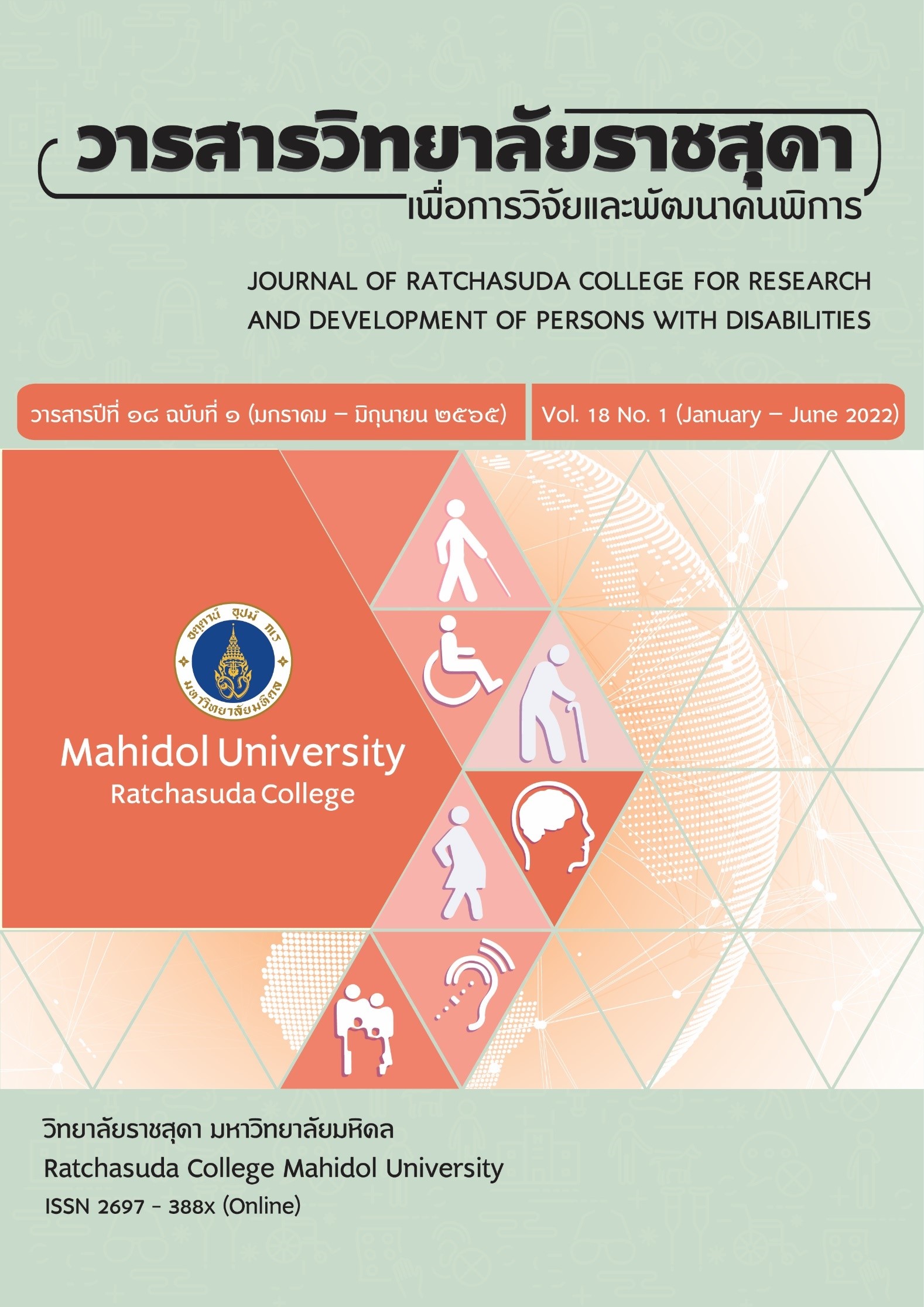The Results of Project-Based Training for Person with Disabilities Affecting Development and Training Skills with Digital Printing Media Production Cirriculum
Keywords:
Digital printing media production course, training skill, development, Project- Based TrainingAbstract
This research has purposes: 1. To assess the theoretical development of computer software and information technology knowledge and skills to be used in the production of digital printing media. The sample group was 19 people who was disabilities in mobility, hearing and visually impaired. The training period was 3 months. The research tools were development assessment form and skill assessment form. The data was analyzed by looking for percentage and development score. The results were as follows: 1. The rate of theoretical knowledge development, the use of computer software and information technology of the disabled overall increased at a moderate level with an average of 19.37%, standard deviation 5.11 and 2. Skills in various fields, including the use of information technology, problem solving and decision making, the use of technology and teamwork increased by 47.36%, 56.94, 76.80 and 80.12% respectively. Overall, the learners had an average increase of 65.31% of their skills, which was in line with setting purposes.
Downloads
References
Abdulloh, W., & Niemted, W. (2020). Arrangement of learning environment to promote learning skills in the 21st century “Concept Theory and Practice”. Journal of Humanities and Social Sciences, Prince of Songkla University Pattani Campus, 7(2), 227-246.
Attanan, Y., Sombunsukho, S., & Bunlue, S. (2017). E-Future classroom: A study mixed reality learning environment for deaf learners in Thailand, International Journal of Environment & Science Education, 12(10), 2291-2315.
Bunprasert, K. (2018). The concept of developing self-learning towards sustainable knowledge. Retrieved from
https://e-library.siam.edu/self-learning-development-to-sustainable-knowledge-concept/
Duerama, N. (2016). Effect of project-based learning with local wisdom on science achievement, science process skills and instructional satisfaction of grade 10 students. (Master’s thesis). Prince of Songkla University, Songkla, Thailand.
Ratchasuda College. (2020). 9 categories of person with disabilities according to the announcement of Thai Ministry of Education 2552 B.E.. Bangkok. Retrieved from https://www.rs.mahidol.ac.th/rs-journal/provision.php
Siriratraka, T. (2020). People with disabilities and social opportunities. Retrieved from https://th.rajanukul.go.th/preview-5037.html
Sompong, N. (2020). Principles and concepts in the production and presentation of media using computers. Retrieved from
http://pro.edu.snru.ac.th/UserFiles/งาน อ.ภัทรดร/หนังสือ/นวัตกรรมแห่งการเรียนรู้/44นวกรรมในการเรียนการสอน.doc
The National Disability Rights Network, Protection and Advocacy for Individual with Disability (2020). The life quality development of person with disabilities. Retrieved from https://www.protectionandadvocacy.com/การพัฒนาคุณภาพชีวิตคนพ/
The National Empowerment of Persons with Disabilities Committee (2017). The national life quality development plan for person with disabilities, 2560-2564 B.E. (5). Retrieved from http://www.oic.go.th/FILEWEB/CABINFOCENTER28/DRAWER042/GENERAL/DATA0000/00000138.PDF
Yau, S.S., Gupta, S.K., Karim, F., Ahamed, S.I., Wang, Y., & Wang, B. (2003). Smart classroom: Enhancing collaborative learning using pervasive computing technology. Conference Proceedings of 2003 ASEE Annual Conference and Exposition: Staying in Tune with Engineering Education, Nashville. TN, USA: ASEE Annual, 13633-13642.
Downloads
Published
How to Cite
Issue
Section
License
Copyright (c) 2022 JOURNAL OF RATCHASUDA COLLEGE FOR RESEARCH AND DEVELOPMENT OF PERSONS WITH DISABILITIES

This work is licensed under a Creative Commons Attribution-NonCommercial-NoDerivatives 4.0 International License.
บทความที่ได้รับการตีพิมพ์เป็นลิขสิทธิ์ของวารสารสถาบันราชสุดาเพื่อการวิจัยและพัฒนาคนพิการ






